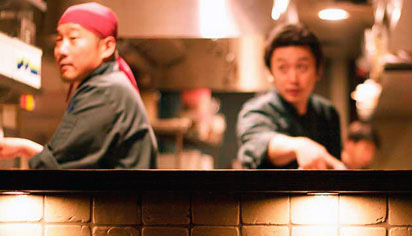Excusez Moi?
I was reading about a recent survey of British holidaymakers and their experiences with language gaffes, while traveling overseas.
The study revealed mistakes such as asking for a “head baked Al Furno” when trying to obtain a hairdryer; calling Greek locals “squid”, asking for a “condom” at the breakfast table, and declaring yourself “pregnant” to a French waiter.
It reminded me of my most embarrassing moment, EVER!
I had just finished High School and instead of finding myself face-down in someone else’s vomit at Schoolies Week on the Gold Coast – I decided I’d rather do an exchange to Japan and put my five grueling years of language study to the test.
Quintessentially Japanese, my host family were hospitable, considerate and generous. To celebrate my arrival, they decided to shout a very exclusive, VERY traditional dinner. Kimonos and all – the restaurant was beautiful and quiet. Sparingly populated by only the most fashionable and well-to-do, my host-family so very proud to show-off their Caucasian guest, paraded me to our place on the Tatami floor.
Patriotic and respectful, like the French, I find the Japanese are simply grateful that you are attempting to speak their language. When traveling through France, I always made an effort to speak French, no matter how poor my translation or pronunciation.
I never personally encountered the clichéd French language snob, I only observed (all too frequently) Americans talking louder and louder, believing the French to be deaf, rather than acknowledging their own linguistic deficiencies.
The French and Japanese are very conscious about “saving-face” and would rather say nothing and appear aloof than embarrass themselves by speaking poor English.
My host-father had ordered the finest Sake, and although I was not legally old enough to drink, they insisted that I enjoy the full Japanese dining experience.
He raised his glass and asked (in Japanese) “what do you say in English to toast to good health, etc.?”
I explained (in Japanese) that most Aussies respond with a “Cheers”, however, I had grown up in a little Italian community, and so with fervent enthusiasm, exclaimed… “Cin Cin”.
Suddenly, the still restaurant had somehow become even more stone silent and everyone was starring at the white-girl who had just yelled out “PENIS!”!
Pronounced CHIN~CHIN, I had inadvertently used the colloquial term for the taboo male genitalia, to announce my arrival in the country.
Thankfully, my host-family was too polite and good-humoured to make more of a scene and discretely explained what I had said.
I had never been so embarrassed and have since, always been cautious to check before I speak.
It was encouraging to learn from the survey, that other travelers are not discouraged from trying, with 95% of British participants attempting to speak the local language on holiday, particularly those traveling to Spain or France.
In Portugal and France, the word for “condom” is “preservativo” and “preservatif” and is sometimes mistakenly used when asking for jam. Your waiter may be confused if you then mispronounce “Je suis plein” which means, “I am full”, but often misspoken as “pleine”, which instead translates as “I am pregnant”.
Be careful not to offend Greek locals when greeting them with “good morning” – “kalimera” which bears an unfortunate resemblance to “calimari”.
If you are traveling and want to brush up on the local language Timothy Ferris has some excellent tips on how to fast-track your learning and language skills in his Best Selling Book, The 4 hour work week.
If you fear offending someone or ending up in the wrong place, maybe just stick to the basics. The most commonly used words and phrases while traveling are:
Hello
Please
Thank you
Goodnight
Where are the toilets?
How much?
and… “a bottle of house red, please”.
Have you just wanted to curl-up and cringe after realizing what you said in a foreign tounge?
We’d love to hear your Traveling “Opps” stories and language gaffes!
comment below or email Natalee.Jewel@gmail.com


